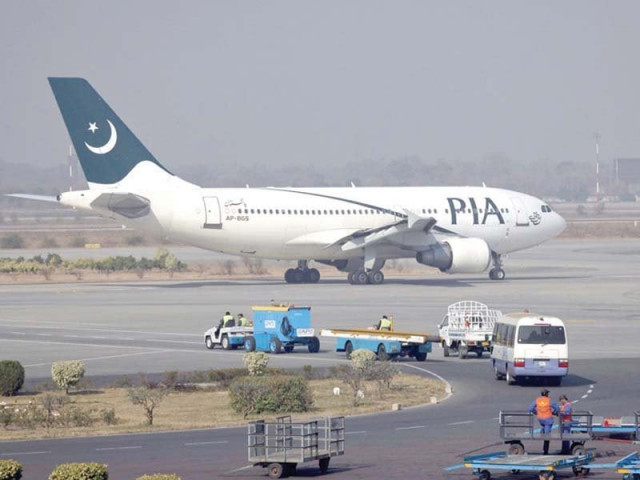PIA retires Rs19b debt in one year
Pakistan International Airline’s domestic debt fell 12% to Rs137.7 billion by March 2020

The state-owned airline has managed to pay off debt despite remaining in losses over the past several years. PHOTO: FILE
PIA’s domestic debt shrank by Rs19.2 billion, or 12%, to Rs137.7 billion by March 2020 compared to Rs156.9 billion in March 2019, the State Bank of Pakistan (SBP) reported on Tuesday.
“PIA pays around Rs5 billion a month to retire debt and liabilities (that stood at over Rs400 billion on June 30, 2019),” PIA spokesperson Abdullah Hafeez Khan said while talking to The Express Tribune.
The net impact of debt repayment, however, remained significantly lower in the one-year period under review because PIA simultaneously “gets the debt restructured and rolled over … or sometimes takes fresh loans from banks to pay off old ones to keep the airline operational,” he said.
The state-owned airline has managed to pay off debt despite remaining in losses over the past several years.
“We hit almost break-even level (no profit and no loss) from operations in the year ended December 31, 2019 (numbers are yet to be made public),” Khan claimed. “However, the coronavirus has badly impacted the airline now. Flight operations have remained virtually suspended for the past seven weeks under the lockdown.”
At present, the airline is undertaking limited flight operations. It is only flying foreigners to their home countries and bringing Pakistanis back home on government’s directives. “These are mostly one-sided empty flights. The government is bearing expenses for such flights,” he said.
Ramazan used to be a high time for Umrah pilgrimage and a big source of revenue generation for the national air carrier. People, however, could not perform Umrah this year due to the global health crisis, he said.
“PIA has 31 passenger planes in its fleet at present,” Khan said.
“Revenue for six months ended June 2019 recorded a significant growth of 44.6% (to Rs65.92 billion) as compared to (Rs45.59 billion in) 2018 and accordingly loss from operations fell 59.4% (to Rs7.12 billion) as compared to (Rs17.54 billion in) 2018,” PIA CEO Arshad Malik said in the directors’ report for the half year ended June 30, 2019.
“Passenger seat factor was 84.1% in 2019 compared to 77.7% in 2018. While the operating loss improved, the company got a severe hit due to currency devaluation and rising interest rates,” he said.
Before the outbreak of Covid-19, the PIA management was focused on rationalising routes like increasing the number of flights on profit-making routes and curtailing on not-so-profitable sectors.
It was not only PIA that managed to pay off its debt in the year under review, but the Water and Power Development Authority (Wapda) also retired the domestic debt by a net Rs1.2 billion to Rs86.8 billion by March 2020 compared to Rs88 billion in March 2019, the central bank said.
Overall, the outstanding domestic debt of public sector enterprises (PSEs) fell a net Rs6 billion, or 0.4%, to Rs1.58 trillion by March 2020 compared to Rs1.59 trillion in March 2019, the SBP said.
However, Oil and Gas Development Company (OGDC)’s domestic debt increased Rs600 million to Rs6.1 billion in the year under review while net borrowing by other PSEs surged to Rs1.12 trillion compared to Rs1.08 trillion earlier. Besides, the PSEs borrowing from banks for commodity operations dropped Rs25.3 billion, or 12%, to Rs189.6 billion compared to Rs214.9 billion earlier, the SBP said.
The current Pakistan Tehreek-e-Insaf (PTI) government had promised in its election manifesto in 2018 that it would turn around the PSEs - including PIA and Pakistan Steel Mills (PSM) - by “appointing and empowering non-political and autonomous boards, signing performance contracts with boards, agreeing on KPIs, and selecting outstanding professionals as CEOs on merit through the boards.”
Published in The Express Tribune, May 13th, 2020.
Like Business on Facebook, follow @TribuneBiz on Twitter to stay informed and join in the conversation.



















COMMENTS
Comments are moderated and generally will be posted if they are on-topic and not abusive.
For more information, please see our Comments FAQ